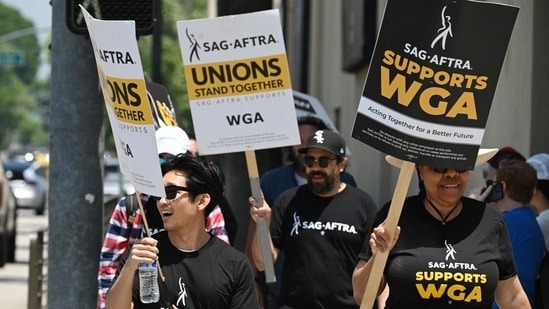Sag-aftra to Hold Out for Best Deal

Bryan Cranston, Demi Moore, and a host of other high-profile actors are making waves in the entertainment industry by taking a strong stand with their union, the Screen Actors Guild‐American Federation of Television and Radio Artists (SAG-AFTRA). They are rallying members to push for more favorable terms in the upcoming negotiations for their contracts. This collective movement signals a significant moment as these luminaries use their influence to champion the cause of fellow actors and performers, advocating for a deal that can set new standards in a rapidly evolving media landscape.
The entertainment sector has seen monumental shifts in recent years with the rise of streaming services and changes in how content is produced and consumed. These transformations inherently affect the livelihoods of actors, whose compensations and working conditions are directly tied to the fortunes of an industry in flux. Cranston and Moore are spearheading this call to action at a time when unity within the guild is paramount to ensure that these negotiations take into account the complexities brought about by digital media advancements.
Long hours on sets, compensation for streaming productions, health benefits; these are among the key issues that SAG-AFTRA members are focusing on as part of their negotiating platform. The demand for a best possible deal is not just about higher wages but also encompasses concerns over residuals, which have been a contentious topic given the shift from traditional television to on-demand viewing platforms. Residuals—the payments made to actors for reruns and other secondary broadcasts of their work—are undergoing scrutiny to better reflect current consumption habits.
Cranston, renowned for his role in “Breaking Bad,” along with Moore, known for her work across multiple box office hits, carries considerable clout within Hollywood circles. Their voices symbolize not just A-list power but also encapsulate the shared interests of lesser-known performers who rely on fair union negotiated agreements to sustain their careers. Their involvement lends weight to ongoing conversations about what constitutes just compensation in an era where traditional metrics of viewership no longer apply.
In urging SAG-AFTRA to hold out for the best deal possible, these actors underline the necessity for strategic patience. Negotiations of this magnitude, which can set precedents affecting thousands of professionals, are invariably complex. Cranston, Moore, and their compatriots are thus sending a clear message: solidarity is critical when confronting institutions and systems that may otherwise overlook individual needs in favor of broader corporate gains.
Their campaign also serves as an impetus for all members of SAG-AFTRA to become more informed and engaged with union activities. As talks progress, it remains pivotal that those whose lives will be affected by these decisions have a voice—and with people like Bryan Cranston and Demi Moore leading the charge, that voice is poised to be heard loud and clear. Their goal goes beyond securing short-term gains; indeed, they aim to lay down new foundations that will support actors’ rights well into the future.






